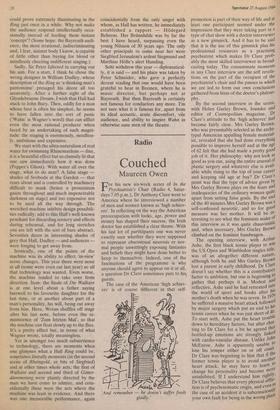Opera
Technology
Rodney Milnes
According to Bayreuth tradition, new Ring productions improve at their second showings — this was certainly true of the Chereau staging — so I was not too downcast at missing the Georg Solti/Peter Hall Ring last year; surely, I thought, it couldn't be as bad as everyone said it was, and anyway it would be better this time. Right in the first instance, in that parts of it are excellent, but alas wrong in the second, to judge from photographs and travellers' tales. Had this year's second cycle been on show at, say, Covent Garden, Sir Peter would have had his name taken off the programme quick sharp. The lighting and stage management were frequently abysmal.
Hall's stated aim to stage a romantic, even naturalistic Ring, to treat it as narra- tive, simply to play the text as clearly as possible, seems to me admirable, though it drew withering scorn from a press corps thirsty for fresh intellectual stimuli and dread word — for a 'concept'. There is quite enough intellect in Wagner's text already, thank you, without any extra input from a producer, and the sort of approach that paid such dividends in Fide- no and Don Giovanni at Glyndeboume
could prove extremely illuminating in the Ring just once in a while. Why not make the audience respond intellectually occa- sionally instead of feeding them instant 'concept'? (Some hope: the Bayreuth audi- ence, the most irrational, indiscriminating and, I fear, sinister body I know, is capable of little other than baying for blood or mindlessly cheering indifferent singing.) Sadly, Sir Peter faltered in carrying out his aim. For a start, I think he chose the wrong designer in William Dudley, whose description of the Ring as 'a thinking man's pantomime' presaged his decor all too accurately. After a further sight of the Glyndebourne Dream, I wish that Hall had stuck to John Bury. Then, oddly for a man whose best is often his simplest, he seems to have fallen into the sort of panic (`Wahn' is Wagner's word) that can afflict even the most rational producer when faced by an undertaking of such magni- tude: the staging is enormously, needless- ly, ambitious and expensive.
We start with the ultra-naturalism of real water for swimming Rhinemaidens — fine, it is a beautiful effect but so clumsily lit that one saw immediately how it was done (Pepper's Ghost). With water all over the stage, what to do next? A false stage shades of Svoboda at the Garden — that rears about and is controlled by machinery difficult to mask (hence a proscenium gauze throughout and much impenetrable darkness on stage) and too expensive not to be used all the way through. The wretched machine inhibits design possibili- ties radically; add to this Hall's well-known penchant for discarding scenery and effects during rehearsal, and for long stretches you are left with the sort of bare abstract, Seventies decor in interesting shades of grey that Hall, Dudley — and audiences— were longing to get away from.
Ironically, one of the points of the machine was its ability to effect 'in-view' scene changes. This year there were none at alt-(some were even cut last year) so all that technology was wasted. Even worse, the machine tended to take over from direction. Item: the finale of Die Walkare is at one level about a father saying farewell to his favourite daughter for the last time, or at another about part of a man's personality, his will, being cut away from him. Here, Wotan shuffles off stage after his last note, before even the re- miniscence of `Zum letzten Mal', so that the machine can float slowly up to the flies. It's a pretty effect but, in terms of what Wagner wrote, totally meaningless.
Yet in amongst too much subservience to technology, there are moments when one glimpses what a Hall Ring could be, sometimes literally moments (in the second scene of Rheingold, or bits of Siegfried) and at other times whole acts; the first of Walkiire and second and third of Goner- dammerung were plainly directed by the man we have come to admire, and coin- cidentally these were the acts where the machine was least in evidence. And there was one memorable performance, again
coincidentally from the only singer with whom, as Hall has written, he immediately established a rapport — Hildegard Behrens. Her Briinnhilde was by far the best I have heard, surpassing even the young Nilsson of 30 years ago. The only other principals to come near her were Siegfried Jerusalem's ardent Siegmund and Matthias H011e's alert Hunding.
Solti withdrew this year — diplomatical- ly, it is said — and his place was taken by Peter Schneider, who gave a perfectly decent reading that one would have been grateful to hear in Bremen, where he is music director, but perhaps not at Bayreuth. But then Bayreuth is certainly not famous for conductors any more. I'm not sure what it is famous for, apart from its ideal acoustic, acute discomfort, vile audience, and ability to inspire Wahn in otherwise sane men of the theatre.







































 Previous page
Previous page